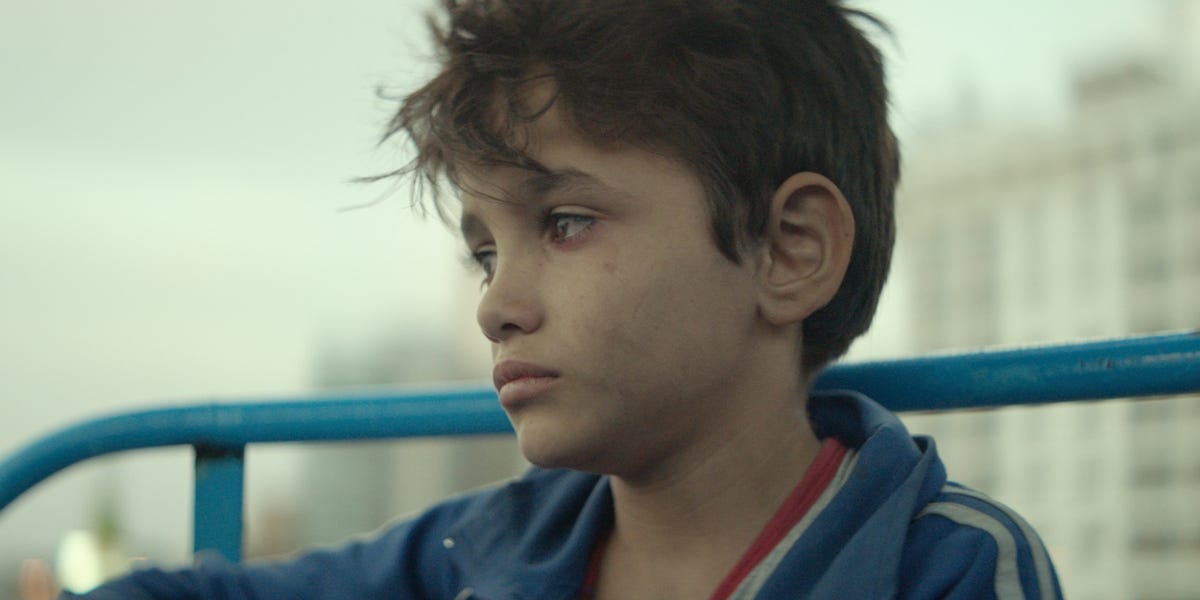

There are few moments of respite in the Lebanese drama Capernaum. Even in the quiet, in the stillness, in the moments of humor, there’s an ever-present reminder that in these character’s lives, in the lives of the people they represent, there is rarely rest.
The film, which takes place in Beirut, follows Zain, a 12-year-old boy who’s in jail for a stabbing. Now, Zain wants to sue his parents, who don’t know his actual birthdate, for bringing him into the world.
Written and directed by Nadine Labaki, Capernaum—which is named for the biblical village that was cursed by Jesus and is now used to indicate chaos—was immediately loved by critics. It received a 15-minute standing ovation at the 2018 Cannes Film Festival and ultimately won the festival’s Jury Prize.
“I think the idea came from what’s happening around us in the world,” Labaki told ELLE.com over the phone. “The sight of those children…that you see in the media dying from chemical weapons or a child that’s separated from his parents on the Mexican border…. At the end of the day, it’s really the children who are paying the highest price. I was looking at this image of this boy that was found on the shores of Turkey and wondering, ‘If he could talk, what would he say to the world? What would he tell us?’”
In Zain, we find some of those answers. He lives with his parents and many siblings, and is used to sell drugs and work on the streets, while being emotionally and physically abused at home. He decides to run away after he’s unable to stop his parents from selling his sister, a close confidant, to their landlord for some chickens.
Zain, played by Zain al Rafeea, a Syrian refugee who could not write his name when they started shooting, is then taken in by Rahil (Yordanos Shiferaw), an African woman with a toddler (Boluwatife Treasure Bankole) and no legal papers. When Rahil fails to come home one day, Zain is tasked with taking care of her baby and providing for them both.
“He was really funny about it,” Labaki said, of asking al Rafeea to be in the film. “He [said], ‘Yeah, why not? I might become famous or something.’ He felt that he was almost part of the mission, because he was representing all of the children he sees suffering—things that he knows, things that he’s seen. It was something that was very natural to him.”
Labaki’s team shot the film over the course of six months. Al Rafeea, as well as others, had no acting experience, so the camera crew took their time while shooting, creating space for the children to feel comfortable and for the action to organically unfold. Many had backgrounds similar to what’s portrayed on screen, and the children were cast right from their own neighborhoods; Al Rafeea himself was found on the street, playing with his friends next to his house. To help create a safe environment, the team used natural light and a handheld camera. They never called “action” on set.
Labaki spent four years researching these families, speaking to dozens of children in prisons, detention centers, and their neighborhoods. She spoke to children who have been facing extreme neglect—some don’t know their exact birthday, just like the main character.
“What is very striking is that they know that what’s happening to them is unfair,” she says. “[These are] kids who think this world is hell, who think this world is a living hell to them. They have the feeling they’re being punished, and they don’t know why. We failed those kids big time [with] our systems and our governments and our wars and our conflicts and our stupid decisions. We are failing them every day.”
Now, thankfully, al Rafeea’s situation has changed. Cate Blanchett, the president of the jury at Cannes, also serves as a U.N. ambassador and was involved in connecting his family to the United Nations High Commissioner for Refugees. Now, the young actor and his family have resettled in Norway, where he’s going to school and sleeping on a bed for the very first time.
And the movie’s journey is just beginning. It was officially released in theaters on December 14; it has already received a Golden Globe nomination for best foreign language film and made the New York Times’ best movies of the year list.
Its success is striking, especially after a year of American award shows in which female film directors were rarely recognized or praised. But in Lebanon, where Labaki lives, she says there’s not really a film industry, which actually allows for many projects helmed by women.
“We initiate the projects,” she says. “We’re not waiting for someone else to hire us to make films. I think the fact that there’s no film industry—each adventure is really initiated by the filmmaker.”
Now just to see where that adventure leads next.
Be the first to comment